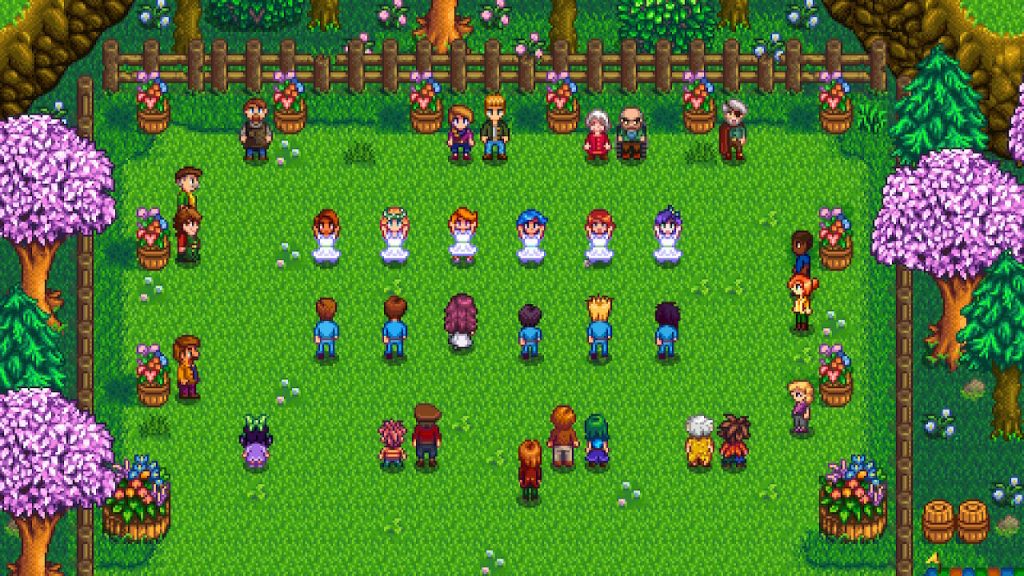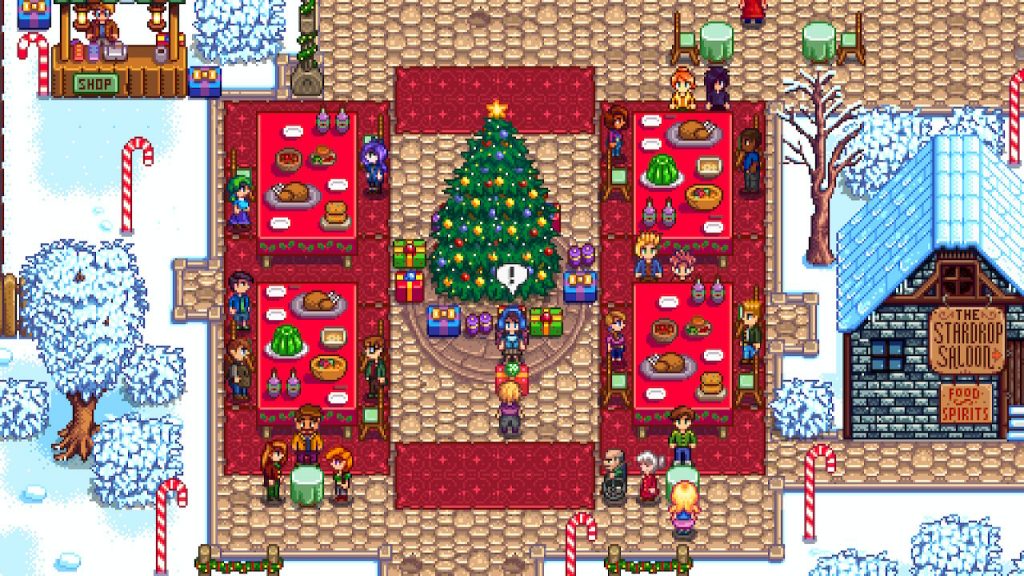Working as a team of one, Eric Barone, better known as ConcernedApe, single-handedly spent four and a half years, 10-hour days, seven days a week, to create Stardew Valley. Re-known as an intimate and humble farming simulator about the monotony of domestic life, Stardew Valley began as part of Barone’s goal to create a spiritual successor to his childhood-beloved game series Harvest Moon, after its newest iterations in the 2010s worsened in quality.
Despite the game’s cheery exterior, Stardew Valley is fundamentally mellow and melancholy with the game beginning on the death bed of the player’s grandpa. He prophesies the inevitability that ‘there will come a day when you feel crushed by the burden of modern life, and your bright spirit will fade before a growing emptiness.’ The game only starts then when the player reaches that soulless state where their sombre pursuit for an escape instead brings new challenges, even more difficult than the life they initially ran away from, as the player undergoes the transferral of responsibilities, to transform the depilated farm through hundred of hours of game-play.
You wake up, sow seeds, water crops, nurture your livestock, cut down trees, mine for materials, talk to townsfolk, and fish. There never seems to be enough hours in the day to complete it all.
Whilst you are completing these daily duties, an ever-depleting energy bar counts down the time left before you have to go to bed and repeat the same tasks the very next day. Instead of ‘overwhelming’ the player with responsibilities however, Barone noted, he wanted the players to rather get ‘excited that you’ve got things to do.’ Stardew Valley acts as a perfect loop, one that, as Sam White wrote for GQ, exposes ‘the alchemy of quiet game-making’ as the ‘repetitive monotony’ is turned ‘into therapeutic compulsion.’
Rather than acting as an individual escapist retreat, Stardew Valley displays the value in engaging with the townspeople. Whether it be by checking for rats in the community centre, gathering items for requests on the bulletin board, donating artefacts to the museum, and simply giving presents on villager’s birthdays to romance them (Leah supremacy forever), these small acts of kindness drastically improve the game. Stardew Valley works to, as Stefan Werning argues, ‘remediate community within virtual environments’, encouraging ‘everyday forms of green citizenship’ though communal civic engagement.
In allowing the player to engage in tasks manually by hand, Stardew Valley works to prioritise individual well-being by advocating for a more dulled pace to quotidian living. As Barone noted in his interview with Vulture, when implanting the cooking mechanic for instance in the game, he ensured the cooked items wouldn’t yield more gold than selling the individual ingredients.
‘There is value to making fried eggs [for example] — it heals more of your energy when you eat it — so there’s a point to cooking. But it’s not to make as much money as possible, because then you’ll feel like you have to turn every single ingredient into cooking, which is just more clicking.’
Rather than championing the grind to achieve maximum efficiency as part of the capitalist vortex, Barone highlights the value of taking moments of restoration, thus, positioning Stardew Valley as encouraging more thoughtful, slow-paced gameplay as opposed to draining hyper-production.
In Reframing the Backlog: Radical Slowness and Patient Gaming, Rainforest Scully-Blaker draws on the concept of ‘radical softness’, coined by queer poet and artist Lora Mathis that refers to the ‘deliberate failure to conceal emotion’ in order to stress the power of vulnerability, to adopt the term ‘radical slowness’ that they define as a ‘deliberate failure to “keep up” with the ever-accelerating rhythm of capitalist society as a political act.’ From an ecocritical perspective, slowness has been framed as an effective countermeasure to the capitalist depletion of resources that directly concerns the Anthropocene, defined by Ursula Heise as ‘a new geological age in which human impact itself has become the dominant shaping force on the planet.’ The slow meticulous care and attention encouraged by Stardew Valley champions the connection between the healing of the self, and that of the environment, as the individual forms an intertwined identity with the land, crops and livestock that they have cultivated.
Sometimes when life feels so completely unbearable, and I don’t have the energy to be constantly perceived, I indulge in my own escapist fantasy, namely running away to an idyllic countryside and lying down on a field where no would know my name and history, allowing me to begin again. While Stardew Valley draws the faults in that dream, where they will never be a reality where I don’t have my own problems to face, it allows the player to recognise their own capability to face their difficulties, connecting with the people around them through small individual repeated actions that can bring radical change.
‘Ultimately’, as Barone noted,’ I wanted the game world to feel like a living place. I wanted you to forget that it was a video game and to feel like these people had a life of their own.’ Honestly my 200 hours of gameplay shows he has indeed fulfilled that goal. If you are looking to also wind down after the gruelling Michaelmas term, then I highly recommend taking a trip to Pelican Town and immersing yourself within Stardew Valley.
Featured image: taken by Abigail Hughes


